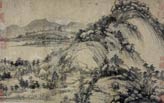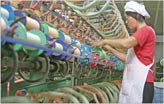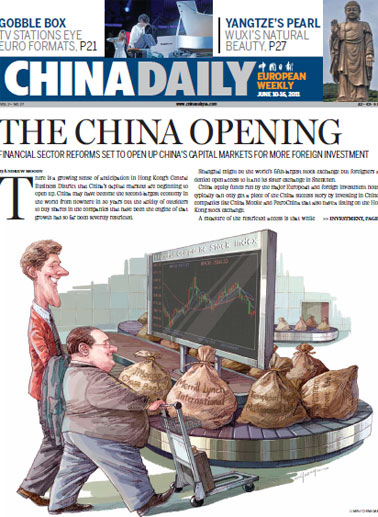Top News
Reserves ratio hiked as CPI hits 34-month high
Updated: 2011-06-14 16:52
(Agencies)
BEIJING - China's central bank raised bank reserve ratios on Tuesday for the ninth time since last October after data showed inflation rising in May to 5.5 percent, its highest level in almost three years.
| ||||
Data released on Tuesday showed economic growth is slowing down, but not too quickly, providing relief for financial markets that China will avoid a hard landing and leaving room for Beijing to focus on fighting inflation.
The increase in reserves takes effect on June 20, the central bank said on its website.
Following the inflation data earlier on Tuesday, several analysts had predicted the central bank would raise interest rates in the coming weeks.
Du Zhengzheng, an analyst at Bohai Securities in Beijing, said the increase in the reserve ratio requirement (RRR) may now delay a rate rise slightly.
"I think the RRR rise this time aims mainly at curbing inflation ... The move is likely to delay the next interest rate rise to the end of this month or the beginning of next month," Du said.
The central bank has raised interest rates four times since October to quell inflation. The central bank's one-year lending rate is 6.31 percent and one-year deposit rate is 3.25 percent.
At 5.5 percent, China's consumer inflation in May was the highest in 34 months. It compared with expectations for 5.4 percent and showed a pick up from 5.3 percent in April.
Non-food consumer prices climbed 2.9 percent from a year earlier, the fastest pace since records began in 2002, showing inflationary pressures are spreading more broadly in the economy.
"Inflation pressures remain large," Sheng Laiyun, a spokesman for China's National Bureau of Statistics told a news conference. However, he said the economy was on track for "stable and relatively fast growth".
Producer prices rose 6.8 percent from a year earlier, above forecasts in a Reuters poll for a rise of 6.5 percent. That had added to the case for further tightening measures, said George Worthington, an economist at IFR Markets, a unit of Thomson Reuters.
Industrial output in May rose 13.3 percent from a year earlier, the slowest pace since November and broadly in line with expectations in a Reuters poll for an increase of 13.2 percent.
Power shortages have contributed to the slowdown in factory output growth, said Xu Biao, an economist at China Merchants Bank in Shenzhen.
"It's worth noting that the slowdown in industrial production is not as bad as some had expected."
May retail sales rose 16.9 percent from a year earlier, compared with expectations for an increase of 17.0 percent, while fixed-asset investment between January and May rose 25.8 percent from a year earlier, against expectations for a rise of 25.2 percent.
Real estate investment rose 34.6 percent in the first five months of 2011 from a year earlier, compared with a rise of 34.3 percent in the first four months.
China's money growth slowed to a 30-month low in May and banks extended fewer new loans than expected, data on Monday showed.
"Overall, China's economic growth is easing gradually, while consumer inflation is still within control. The central bank will raise interest rates again this month, but (then) there will be no further rate rises for the rest of this year," Xu Gao, an economist at China Everbright Securities in Beijing, said before the central bank announced an increase in the bank reserves ratio.
Target in doubt
Inflation has largely been fuelled by a rise in food prices, exacerbated of late by a severe drought in farming heartlands. Sheng said pork prices rose in May more than 40 percent from a year earlier.
Some economists say inflation is also the result of China's massive stimulus during the global financial crisis. Like elsewhere, China is also fighting the inflationary impact of a surge in global commodity costs, which some analysts said may be fuelling producer price pressures.
The government is aiming for average inflation this year of 4 percent, but doubts are growing that the target can be achieved. Average inflation so far in 2011 is 5.2 percent, the statistical bureau said.
Premier Wen Jiabao said earlier this year that China would use all tools available to control inflation.
Zhang Zhuoyuan, an economist at the Chinese Academy of Social Sciences, a leading government think-tank, expects inflation to top 6 percent in June and in remarks reported at the weekend he called for faster steps to push real interest rates into positive territory.
He predicted full-year inflation would be more like 5 percent.
China's economy expanded in 2010 by 10.3 percent, a pace that slowed in the first quarter to 9.7 percent.
But data has suggested a further slowdown in the economy since then. Purchasing managers' surveys showed the factory sector expanded in May at it slowest pace in at least nine months.
Worryingly for financial markets, China's slowdown has occurred alongside a weakening of global growth as Europe struggles with its debt crisis and the United States contends with stubbornly high unemployment. An earthquake has knocked Japan into recession.
Sheng of the National Bureau of Statistics said that even though data has pointed to a slowdown, the economy is on track for "stable and relatively fast growth."
Analysts believe that inflation in China will peak around the middle of the year, so policymakers are close to the end of a tightening cycle.
"China's monetary policy setters know it takes time for policy to have an effect," said Xu Biao of China Merchants Bank.
"So, we believe that the central bank will not raise interest rates in June. In other words, it will change its practice of raising interest rates every two months. In coming months, the central bank may even relax its monetary policy stance."
E-paper

Pearl on the Yangtze
Wuxi is considered a town of natural beauty and its motto is "city of water and warmth".
Prose and consternation
Riding on a mystery train
Way of a warrior
Specials

When two are one
After a separation of 360 years, Huang Gongwang's famous Dwelling in the Fuchun Mountains has been made whole again.

Wealth of difference
Rich coastal areas offer contrasting ways of dealing with country's development

Seal of approval
The dying tradition of seal engraving has now become a UNIVERSITY major


